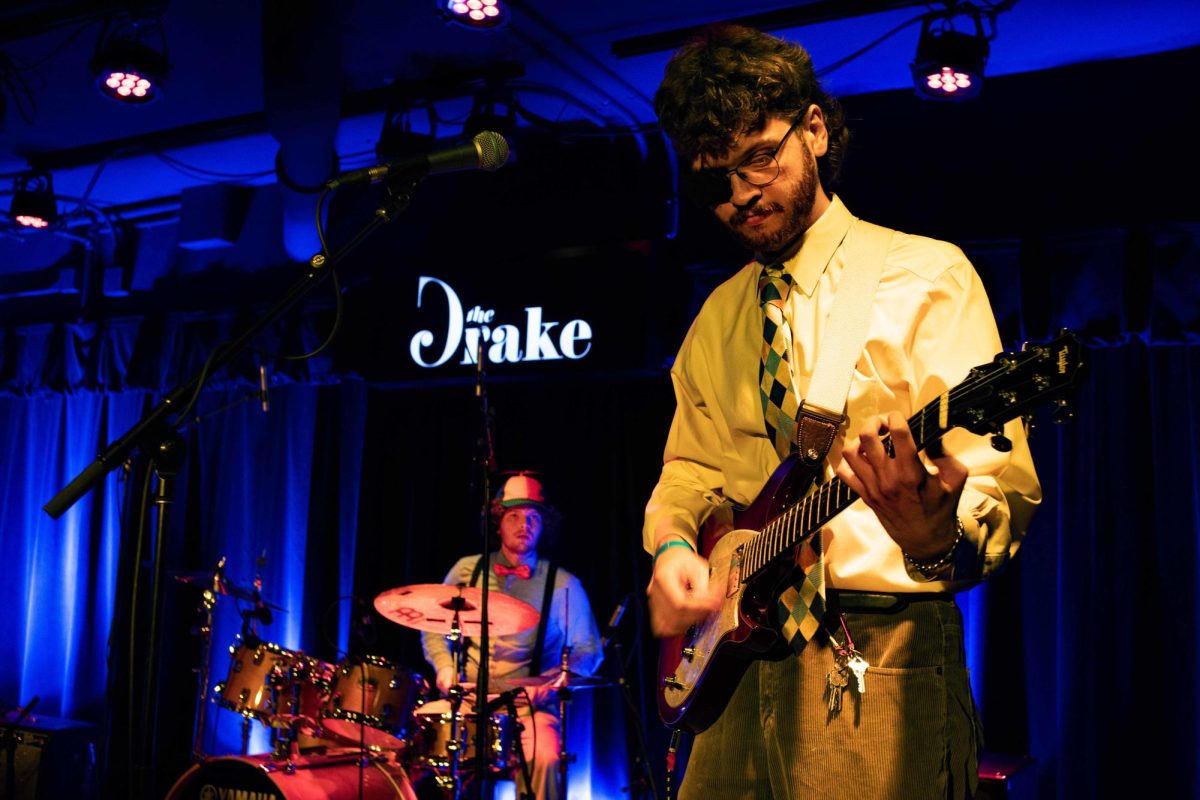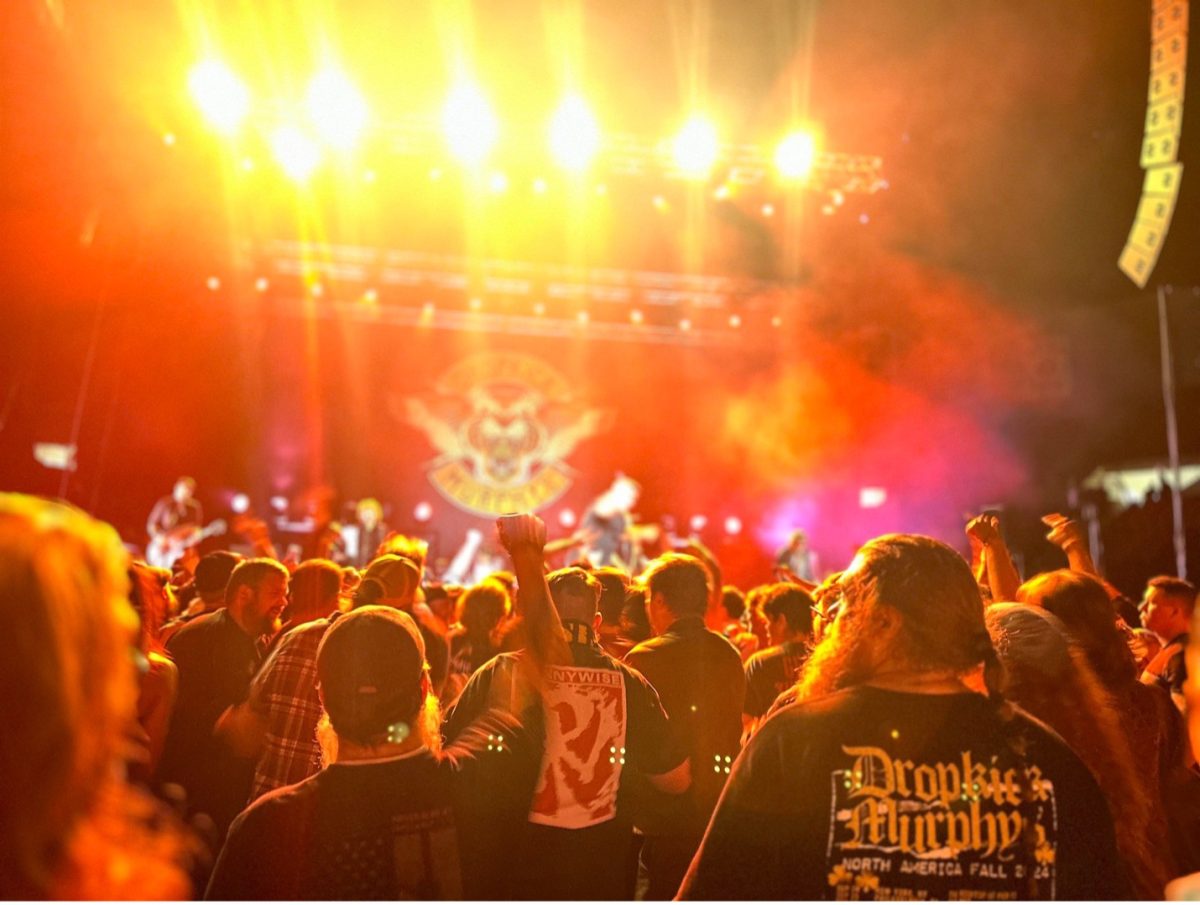
Masks, formal wear and mysterious love, these are the adornments that pop up when the word masquerade is brought up. However, this week, electronic music will also be thrown in to that medley.
Electronic artist Simon Posford will be performing with collaborator Raja Ram as the musical duo Shpongle in The Masquerade, located at Pearl Street Ballroom, on Tuesday at 9 p.m. In association with Project Drop at University of Massachusetts, Shpongle will perform alongside Phutureprimitive.
Shpongle, an English psychedelic music project created in 1996 on Twisted Records, fuses Eastern ethnic elements and synthesized Western style. Posford, also known as Hallucinogen, has reached an international audience from London to Los Angeles to Israel.
Rushing to pick up a few of his girlfriend’s things, Posford took a few moments out his sunny LA day to talk to the Daily Collegian about Shpongle, psychedelics and his musical origins.
“I always wanted to be a musician,” he said. “It’s what I would like to be doing a million years from now, if possible.”
When asked for his reaction to the statement that his music contains elements of jazz, classical, dub and glitch and has been deemed truly genre-defying, he answered, “I do agree with it. I mean, I can understand genres are maybe necessary for journalists to describe music and to sort of pigeon-hole, it may be a bit cruel to say they pigeon-hole it, but in a way they do for people’s benefit.”
“I listen to so many different types of music, so genres don’t matter. I like a little bit of everything, so I think [my music] doesn’t really fit into a category. I’m not trying to make something specifically classical or specifically dubstep. Some people are; they want to make a dubstep track, but I don’t, so that’s why it ends up being sort of genre-less or genre defying”
Posford has come a long way since his younger days. His “genre-less” music is now recorded at his own record label. Twisted Records was conceived while Posford worked at Butterfly Studios, owned by Youth. For those unfamiliar with early 1980s post-punk, Youth is the pseudonym of Martin Glover, the bassist for the hugely influential band Killing Joke. He also collaborated with Paul McCartney.
“I met [Glover] at Virgin recording studios, where I was a lowly assistant – plugging cables in and pandering and feeding the various egos of rock stars that wandered in. And [I] met Youth, went to work for him, he started a studio, met Raj there. And we got along very well and started to make some music together,” said Posford.
His first album, “Twisted,” was released in 1995. Opening track “LSD” has remained the defining sound of the Goa trance subgenre. Shpongle’s first album on Twisted Records “Are You Shpongled?” was released in 1998.
After some time at Butterfly, he felt his 1994 project Hallucinogen needed to become independent.
“It wasn’t really working out for me on Youth’s label, so I decided to set up my own label for artists,” he said.
Baffled by how much money most record labels take from musicians, he wanted to start Twisted as a different kind of label.
“I wanted to set up the label for myself and my friends and music that I like and to be able to get the artists more money and to give them more creative freedom,” he said. Thus, Shpongle was born.
Partnered with Ram, Posford is more of the techie in the group. He explained that “Raj is a fantastic flautist and a great visualizer, but he can’t operate any of the machines, and since making music these days consists of working with computers, I just do the rest, the music.”
A man of many talents, Posford plays drums, bass guitar and the keyboard. He is also able to manipulate those sounds to create his psychedelic and unique music.
When asked how the name “Shpongle” was invented, Posford replied, “One day Raja Ram had taken an incredible substance or whatever and he said, ‘Si, I’m feeling really shpongled,’ and it’s a mixture of a lot of words that sort of fell out of his mouth at the same time.”
Encouraged to elaborate, Posford responded that “he was trying to say stoned, smonged, smashed, spangled, all these words that kind of expressed how he felt, but all came out as one word. So we made a track together and used it as music.”
Being a frequent user of psychedelics, Posford describes his definition of such drugs.
“I guess it’s, you know, they call it mind-expanding – the reason is your mind is expanded. You’re open; you’re picking up stimuli you’re not always so receptive to in everyday life.”
He goes on to say that the psychedelic experience is “feeling everything and makes you make those other dimensions so much more easily acceptable in everyday life.”
Asked if using psychedelics has changed his life, he chuckled and replied that “I hope so yeah…on so many fundamentals levels it has affected me – generally for the better, hopefully for the better.”
However, Posford does try to stay relatively cogent, quoting physicist Richard Feynman by saying that “it’s nice to have an open mind, but not so open that your brain falls out.”
As for his own philosophy, Posford said he is mostly atheist. However, he also mentioned that, “On psychedelics, it’s definitely hard to say that there is no God when you’ve actually met him or her.”
When asked to elaborate, he said, the psychedelic experience had “certainly raised more questions than it answered,” adding that, “Just the fact that it raised all those questions, I think it is insightful in a way, because I think it is good to always keep questioning, never stick to one particular dogma or belief.”
Not only have his “trips” made for a changed paradigm, they have also affected his music. He stated that “I never liked electronic music before I took psychedelics.” Questioning whether it is just his preference or psychedelics, he said, “People used to say to me, ‘Your music is so DMT,’ … I don’t know if it particularly has to do with psychedelics or what I hear. That’s what I listen to anyway, that’s what I like.”
Whether it’s recording or at a concert, fans are always in for something new. Posford’s songs are always spontaneous.
“It’s all on the fly. We start with a blank computer screen and we end up with about 200 tracks of sounds, a track being a layer of sound, not being a song, and gradually range it to some kind of structure to make it a song.”
Using the “universal language of music,” Posford connects with the crowd, “by having brilliant music, great visuals, having fun, and making an exciting event for everybody.”
“If you don’t like music, you don’t like amazing 3D visual stimulation, [and] you don’t like fun … you won’t enjoy it. It won’t be for you,” states Posford. “But if you have even a slightly open mind or are mildly interested in any of those things, then you’ll find a connection”.
At Posford’s concerts, he tries to create the sensory experience of psychedelics for his fans, which are affectionately referred to as “Shpongleoids.”
“For people who aren’t on drugs, they get that sort of massive sensory stimulation, visually and sonically, and the feeling of love for the crowd, and they will be able to experience more clearly psychedelics,” he said.
“I just try to do something that I would want to see and hear myself and hopefully other people will get it, too.”
Eleine Fang can be reached at [email protected].






